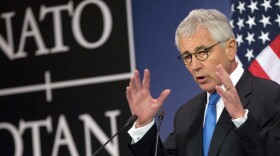
Mary Louise Kelly
Mary Louise Kelly is a co-host of All Things Considered, NPR's award-winning afternoon newsmagazine.
Previously, she spent a decade as national security correspondent for NPR News, and she's kept that focus in her role as anchor. That's meant taking All Things Considered to Russia, North Korea, and beyond (including live coverage from Helsinki, for the infamous Trump-Putin summit). Her past reporting has tracked the CIA and other spy agencies, terrorism, wars, and rising nuclear powers. Kelly's assignments have found her deep in interviews at the Khyber Pass, at mosques in Hamburg, and in grimy Belfast bars.
Kelly first launched NPR's intelligence beat in 2004. After one particularly tough trip to Baghdad — so tough she wrote an essay about it for Newsweek — she decided to try trading the spy beat for spy fiction. Her debut espionage novel, Anonymous Sources, was published by Simon and Schuster in 2013. It's a tale of journalists, spies, and Pakistan's nuclear security. Her second novel, The Bullet, followed in 2015.
Kelly's writing has appeared in the Wall Street Journal, The New York Times, The Washington Post, Politico, Washingtonian, The Atlantic, and other publications. She has lectured at Harvard and Stanford, and taught a course on national security and journalism at Georgetown University. In addition to her NPR work, Kelly serves as a contributing editor at The Atlantic, moderating newsmaker interviews at forums from Aspen to Abu Dhabi.
A Georgia native, Kelly's first job was pounding the streets as a political reporter at the Atlanta Journal-Constitution. In 1996, she made the leap to broadcasting, joining the team that launched BBC/Public Radio International's The World. The following year, Kelly moved to London to work as a producer for CNN and as a senior producer, host, and reporter for the BBC World Service.
Kelly graduated from Harvard University in 1993 with degrees in government, French language, and literature. Two years later, she completed a master's degree in European studies at Cambridge University in England.
-
Albert Bourla, head of the pharmaceutical giant, discusses plans for distributing its vaccine, which it says is 95% effective, and explains the timing of his $5.6 mllion sale of Pfizer stock.
-
Midshipman 1st Class Sydney Barber reflects on the historic nature of her selection as leader of the academy's 4,400 students, her plans for the future and what the appointment means to her family.
-
Chuck Hagel, who was also a Republican senator, says President Trump's moves at the Defense Department are compromising national security, too.
-
The Big Thief singer and guitarist holed up in the mountains of Western Massachusetts to record not one, but two albums, simply titled songs and instrumentals.
-
Ohio Gov. Mike DeWine reflects on his approach to managing coronavirus outbreaks in his state through the winter and what help he needs from the federal government.
-
NPR's Mary Louise Kelly walks listeners through the process of tallying votes and what to expect from All Things Considered on Election Day.
-
The leader of Wilco isn't touring anytime soon, but he's kept creating with help from his sons, who appear with him on a new solo album and in a playful livestream series on Instagram.
-
Manoush Zomorodi of the TED Radio Hour podcast talks with NPR's Mary Louise Kelly about her hearing loss and strategies she's developed to cope.
-
The state saw more than 8,000 new cases last week. Gov. Jared Polis has enacted a mask mandate and limited social gatherings but has encountered pushback.
-
Smith says she started writing Keep Moving as her marriage was ending. It began as a series of affirmations she wrote for herself on Twitter; she found that the posts were helping other people too.







